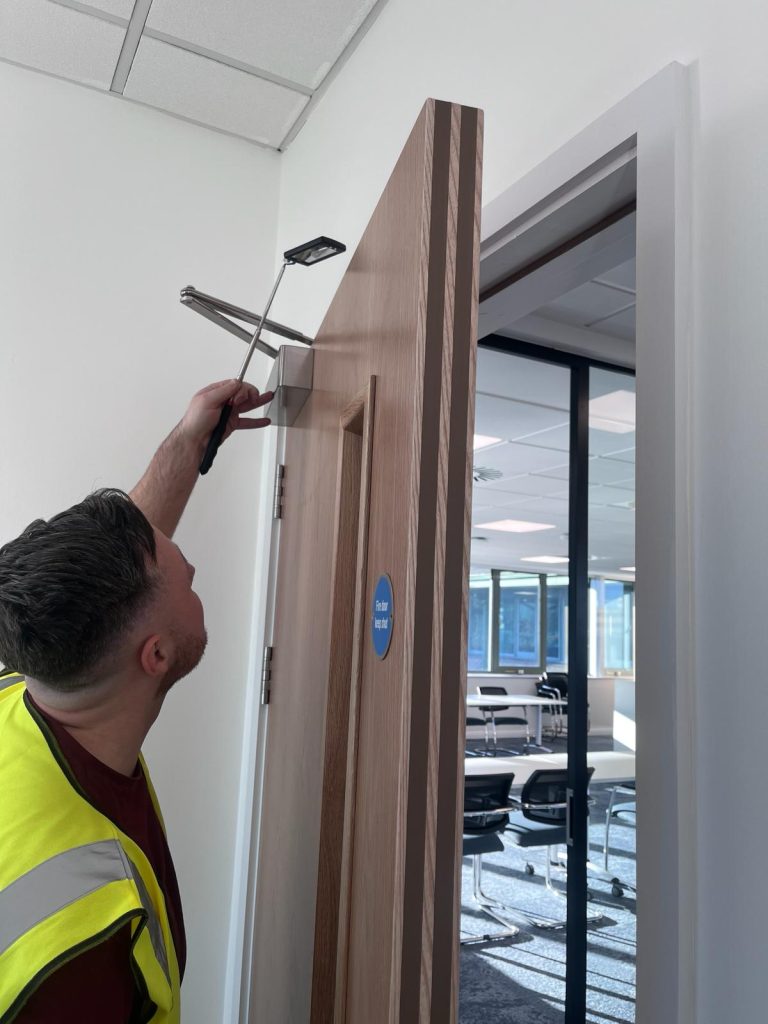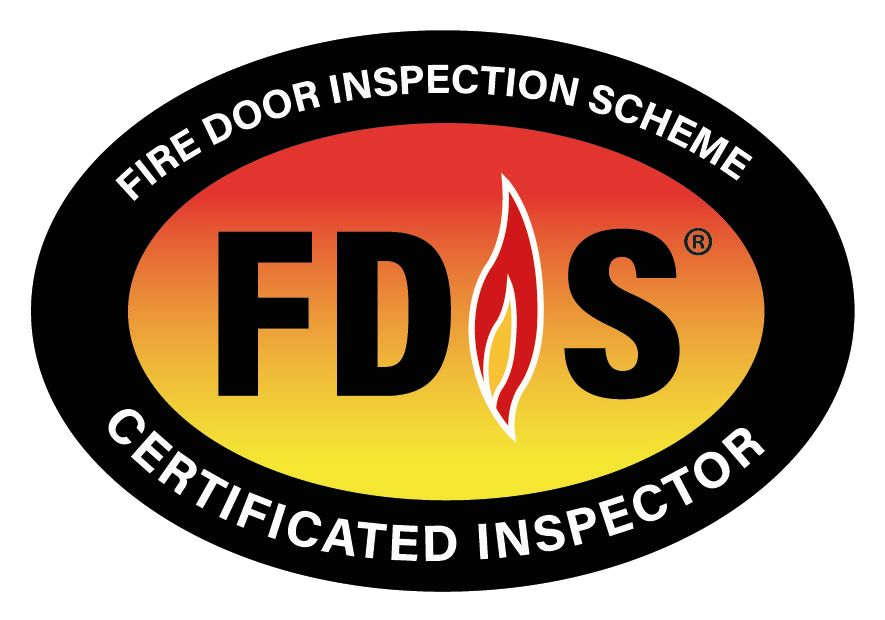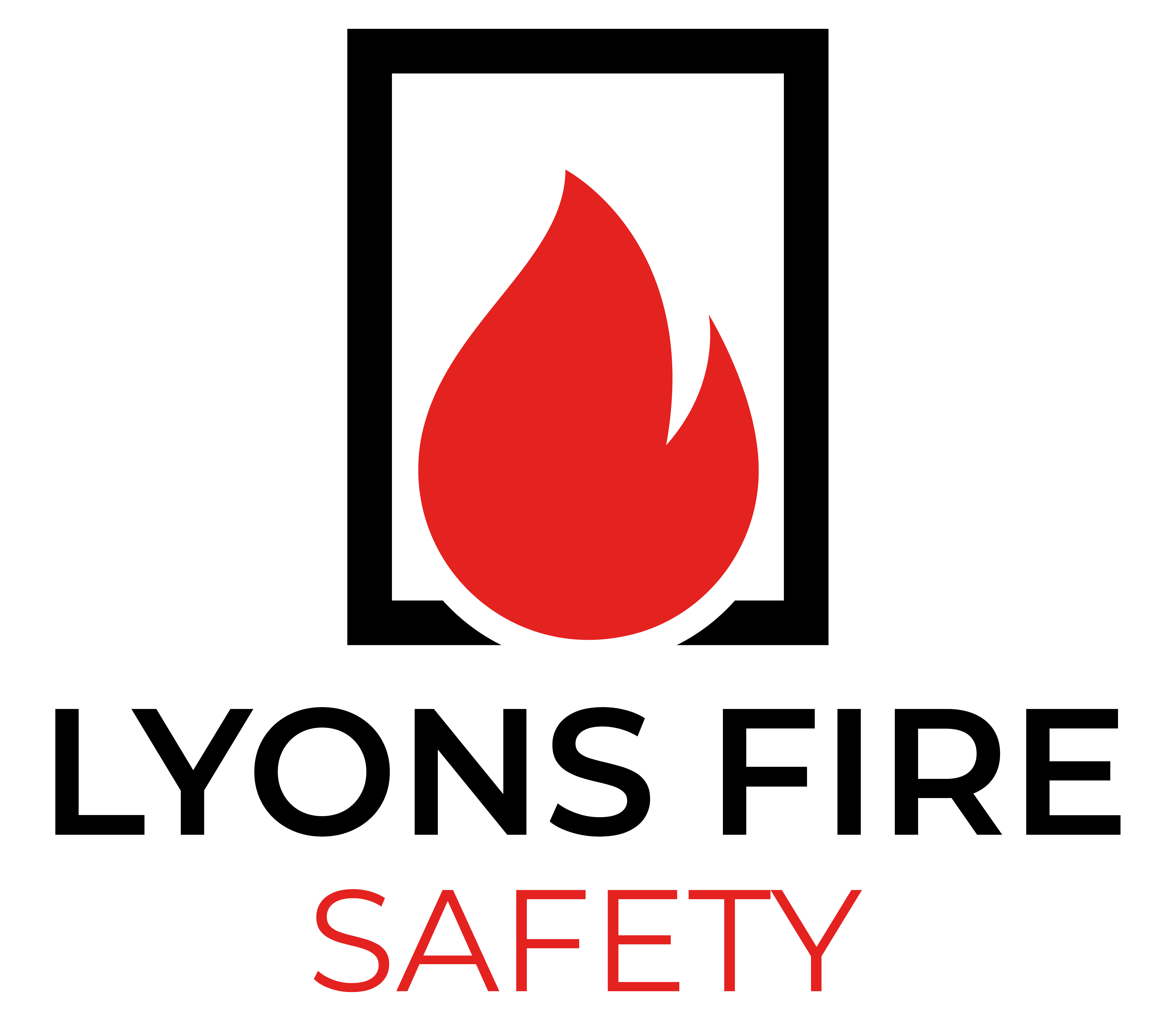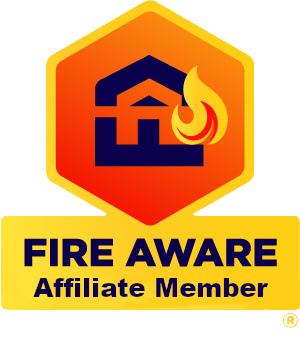Understanding your role as the responsible person
When it comes to fire safety management in the UK, the concept of the “responsible person” is paramount. This role is essential for building managers, flat owners, and office managers.
At Lyons Fire Safety (LFS), we’ve recently seen an increase in enquires from these individuals – so, we’d like to provide our expertise in this area here in this guide. Our team of qualified inspectors can ensure that your property meets all necessary fire safety regulations.
As a Midlands-based family company with years of experience, Lyons Fire Safety specialises in fire door installation, maintenance, and inspection. We understand the challenges you face with existing fire door installations in your workplace. Let us help you meet the UK Government’s safety regulations with our expert services.
What is “the Responsible Person”?
Introduced by the Regulatory Reform (Fire Safety) Order 2005 in England and Wales, the responsible person is legally accountable for fire safety within a building or premises. Here’s a breakdown of who this individual or entity might be:
- In a workplace: Typically the employer or building owner.
- In other premises: Usually the person in control of the building.
- In multi-occupied buildings: Multiple responsible persons may exist, requiring collaboration to ensure safety.
Key Duties of the Responsible Person
Maintenance and Inspections
The responsible person holds significant responsibility for maintaining fire safety measures, including fire doors. Regular inspections are not just recommended; they are a legal requirement under current fire safety regulations.
The best way to avoid penalties and ensure your premises are genuinely safe is to schedule regular professional fire door inspections. Trust Lyons Fire Safety to provide expert evaluations that catch any compliance issues you might overlook. Our thorough inspections offer a second set of eyes and ensure that you have the documentation needed to demonstrate due diligence to authorities.

Compliance with Regulations
Adhering to the Fire Safety (England) Regulations 2022 is crucial. These regulations outline specific requirements for fire door checks, which the responsible person must follow diligently.
Fire Door Inspections
At LFS, fire door inspections are our bread and butter. They’re a critical responsibility of the responsible person. Here’s what they entail, and how we can help bring issues to your attention:
- Buildings with a top floor over 11m high: Inspections of flat entrance fire doors must occur annually, using “best endeavours” to ensure compliance.
- Communal area fire doors: These should be checked at least every three months.
- Annual inspections of all flat entrance fire doors
- Quarterly checks of all fire doors in communal areas
- Documentation of all inspection results
- Immediate action on identified issues
- Bi-annual professional inspections
- Monthly visual checks by competent staff
- Detailed record-keeping of all inspections
- Regular maintenance schedules
Ensuring Competence – The responsible person must ensure that inspections are conducted by competent individuals. This often means engaging certified fire door inspectors, like us at Lyons Fire Safety, who are trained to carry out thorough assessments.
Acting on Findings
After inspections, the responsible person must address any identified issues promptly. This involves arranging for necessary repairs or replacements to maintain compliance and ensure safety.
When issues are identified, prompt action is essential:
Priority Levels
- Damaged core
- Failed closing mechanism
- Broken seals
- Excessive gaps
- Minor seal damage
- Loose hardware
- Light surface damage
- Slight misalignment
- Wear patterns
- Early signs of deterioration
- Performance changes
- Minor cosmetic issues
Challenges and Considerations
- Access to Flats – One of the primary challenges in ensuring fire safety is gaining access to individual flats for inspections. The responsible person must make every effort to check flat entrance doors while respecting tenants’ privacy and schedules.
- Record Keeping – Maintaining detailed records of inspections and the actions taken is essential. This documentation forms part of the “golden thread” of building information, ensuring transparency and accountability.
You can read more on – Golden Thread and the Building Safety Act 2022 – in more depth, here. Alongside, the implications for building safety, and how they impact property owners and managers across the UK.
- Balancing Costs and Safety – While financial implications are a reality, safety must always remain the primary concern. The responsible person must weigh the costs of maintenance and replacements against the potential risks of non-compliance.
Conducting Effective Fire Door Inspections
Importance of Inspections
Regular fire door inspections are vital for protecting building occupants. They ensure that these critical safety measures remain effective. The responsible person must ensure these inspections happen as recommended.
Frequency of Fire Door Inspections
For commercial buildings, it is advisable to conduct fire door inspections at least twice a year. Additionally, the responsible person should perform monthly visual checks to identify any urgent issues that may compromise safety.
Elements Checked During Inspection
A comprehensive fire door inspection involves evaluating several key components, including:
- Vision panels and glazing
- Cold smoke seals and intumescent seals
- Fire-resisting qualities of the doorset
- Condition, fitting, and operation of hinges and hardware
- Relevant markings identifying the fire rating of the doorset
Inspectors assess the door’s ability to close flush with the frame and its overall functionality in containing fire and smoke.
Critical Components
Door Leaf Integrity
- Material condition
- Core sampling (when necessary)
- Surface damage assessment
- Weight and thickness verification
Frame and Hardware
- Frame security and condition
- Hinge alignment and functionality
- Closer operation
- Lock and latch engagement
Seals and Gaps
- Intumescent seal condition
- Cold smoke seal effectiveness
- Gap measurements (head, jambs, threshold)
- Threshold sealing
Glazing Elements
- Glass panel condition
- Secure fixing
- Appropriate fire rating
- Seal integrity
Qualifications for Fire Door Inspectors
To ensure compliance and safety, fire door inspections must be carried out by qualified individuals. Recognised certifications, such as those from the Fire Door Inspection Scheme (FDIS), demonstrate that inspectors have the necessary expertise to conduct thorough assessments.
Consequences of Non-Compliance
Failing to adhere to fire door regulations can lead to severe consequences. The responsible person may face significant fines or even imprisonment for negligence. More critically, non-compliance endangers the lives of building occupants and increases the risk of property damage in the event of a fire.
Record Keeping and Documentation
Maintaining accurate records of fire door inspections is a crucial responsibility for the responsible person. These records may be required during audits by fire authorities and help track the maintenance history of each fire door, aiding in future repairs or replacements.
Lyons Fire Safety: Your Partner in Fire Safety Compliance
At Lyons Fire Safety, we understand the complexities of fire safety management and the critical role of the responsible person. We offer comprehensive services, including:
- Detailed fire door inspections
- Ongoing maintenance
- Expert installation of fire doors
Our qualified team is here to help you navigate the intricacies of fire safety regulations, ensuring you remain compliant and your premises are safe.
Get in Touch for Expert Fire Safety Services
Take the first step in protecting your property and the people within it. Contact Lyons Fire Safety to book a fire door inspection today. Our friendly team is here to support you in achieving full compliance with fire safety regulations.
Lyons Fire Safety is dedicated to helping you meet fire safety regulations and protect what matters most. To schedule a fire door survey or inspection, contact us today:
Phone: 0121 517 0562
Email: david@lyonsfiresafety.co.uk
By understanding and fulfilling your responsibilities as the responsible person, you play a crucial role in maintaining fire safety standards and protecting building occupants. Let us assist you in this vital task.
Frequently Asked Questions (FAQs)
How often should fire doors be inspected?
Fire doors in commercial buildings should ideally be inspected twice a year, with regular visual checks conducted monthly by the responsible person.
How do I manage fire door safety in a multi-tenant building?
Create a comprehensive management plan that includes clear communication channels, scheduled access arrangements, and documented procedures for addressing issues across different areas of responsibility.
What are the consequences of neglecting fire door inspections?
Neglecting fire door inspections can lead to fines, legal repercussions, and increased risks to occupant safety in the event of a fire.
How often should fire doors be replaced?
The lifespan of a fire door depends on various factors including usage, environment, and maintenance. Professional inspections will determine when replacement is necessary rather than repair.
Can I conduct fire door inspections myself?
While regular visual checks are important, professional certification is required for formal inspections. These ensure thorough assessment and documentation of fire door condition and compliance.
How can I ensure my fire doors are compliant?
To ensure compliance, engage qualified inspectors, maintain detailed records, and adhere to inspection schedules as mandated by current fire safety regulations.
What should I do if I identify issues with my fire doors?
If you identify issues during inspections, it’s crucial to act immediately. Arrange for repairs or replacements to ensure ongoing compliance and safety.
Can Lyons Fire Safety help with fire door installations?
Yes, Lyons Fire Safety provides expert installation services for fire doors, ensuring they meet all necessary safety regulations. We go beyond inspections, and support installers every step of the way through pre-installation guidance, logging and documenting the process, and quality assurance.
How can I maintain records of fire door inspections?
Maintain a log of all inspections and actions taken, including dates, findings, and any repairs made. This documentation is essential for compliance and audits.


